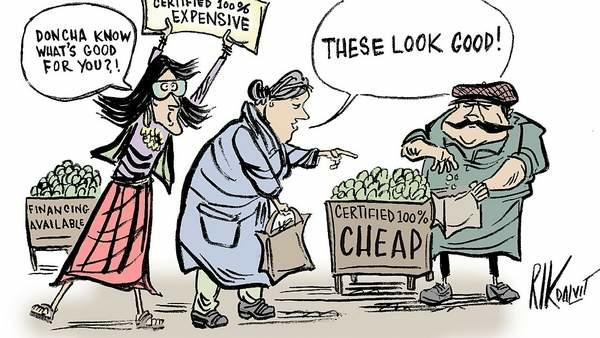People who were very religious had more favorable attitudes toward the gluten-free fruit cup and were more likely to say they would buy it than they would the organic kind.
The authors framed that result as religious people caring less about "sustainability" - they did not want to side with environmentalists.(1) But that may be the wrong conclusion. Forget forcing this into the "Moral Foundations Theory" hypothesis, it may simply be that religious people are more scientifically literate than Whole Foods shoppers and recognize that a food process that requires more land, more pesticides, and causes more environmental strain is the opposite of sustainable.
There is simply nothing sustainable about organic food. On any level. It has higher prices, lower yields, and would lead to mass starvation if we were forced to revert to it.
And it could also be that religious people care more about health. Gluten is poison to celiac patients, so a gluten-free label has some value to 2% of the population whereas organic food is definitely a label for the economic 1%.
Given a choice between one or the other, with no normal-priced alternative, they may have chosen health over the intellectual placebo of a particular type of pesticide (there is no GMO fruit, so that couldn't be it, nor does fruit contain gluten), they may know per USDA's National Organic Standard Board even the pesticide does not have to be organic if an organic one does not work. They may know that the organic process has dozens and dozens and dozens of exemptions for various synthetic ingredients, all chosen by organic farmers to make them more competitive with conventional food. It is a meaningless label sold by 80 groups across the country with no spot checking to see if any of it is really organic. All studies show it is certainly not pesticide free.
If you have a choice between a label that caters to the Food 1% or a label that at least informs 2% with a real health issue, I am going with the 2% every time.
But that is me. This is the label most people care about, and they are right to do so. Thanks, American farmers, for making real choice possible.

Credit and link: Capital Press
Reference: Minton, E.A., Johnson, K.,&Liu, R. (2019). Religiosity and Special Food Consumption: The Explanatory Effects of Moral Priorities. Journal of Business Research, 95, 442-454.
NOTE:
(1) It is a psychology survey, online, so it was uncontrolled and has maybe a two sigma confidence level. Psychology is overwhelmingly left-wing and anti-religious, which may be factors in how they quantified how religious people are. But they are "spiritual" and if you have ever been to a psychology conference, you know a drinking game involving a shot of whisky every time a panelist invoked "His Holiness the Dalai Lama" would land you in the hospital with alcohol poisoning.




Comments